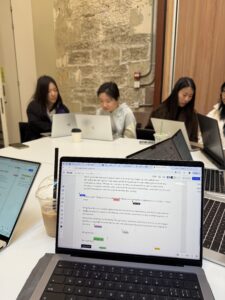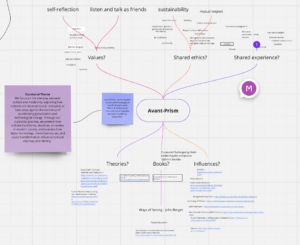Week4 Blog|Collective(1)”Avant-Prism”
![{"data":{"infoStickerId":"","capability_extra_v2":{"filter":[{"effect_id":"87689656","origin":"heycan","resource_id":"7429656172535222835"}],"imageeffect":[{"origin":"heycan","effect_id":"1012192","resource_id":"6916783724277273101"}]},"playId":"","os":"ios","imageEffectId":"1012192","product":"retouch","stickerId":"","activityName":"","effect_type":"tool","appversion":"12.0.0","capability_key":["edit","imageeffect","filter"],"enter_from":"enter_launch","effect_id":"edit","pictureId":"A7A41131-BF5E-4B9F-8A3B-A4E8B6363590","filterId":"7429656172535222835"},"source_type":"douyin_beauty_me"}](https://blogs.ed.ac.uk/s2648436_curating-2024-2025sem2/wp-content/uploads/sites/11134/2025/02/IMG_6664-scaled.jpeg)
⚫️Online Meetings: The Birth of a Name
Before our classroom discussion, we held an online group meeting to consolidate our diverse curatorial directions and establish a shared conceptual foundation. Through this discussion, we recognised key elements that would define our approach:
1. Concept of the name: Avant-Prism
“Avant-Prism” combines “Avant” (French, meaning “avant-garde”) and “Prism” (English, prism). This combination is intended to express two meanings:
Avant-garde – emphasizes innovation, foresight and challenges the traditional curatorial framework.
Prism effect – symbolizes the deconstruction and reorganization of multiple perspectives, implying the refraction, reshaping and fluidity of culture in different environments.
This name not only reflects the group’s curatorial concept, but also symbolizes the intersection and reconstruction of different cultures and perspectives.
⚫️Class discussion content: The factors behind the group name

1. Values: The curatorial ethics behind the name
During the naming process, other members of the group discussed values such as “self-reflection”, “listen and talk as friends”, “sustainability” and “mutual respect”. These values reflect the core position of the group’s curatorial practice, namely:
Curating is not just a display, but a process of dialogue and reflection, which requires an open and inclusive attitude and willingness to listen to different voices.
Respect cultural differences, accept individual uniqueness, and allow audiences to participate in cultural diversity through curating.
Emphasizing sustainability is not only an environmental protection concept at the ecological level, but also cultural sustainability, that is, how to maintain cultural memory and identity under the wave of globalization.
These core values ultimately influenced the choice of the name “Avant-Prism” because it reflects the characteristics of curating as a reflection of multiple perspectives, while emphasizing that curating should be an inclusive, diverse and continuously influential practice.
2. Shared Ethics & Experience: The Significance of Cross-Cultural Curating
In class, we discussed the shared ethics and shared experiences of the group members, including:
Cultural Identity – How to reflect cross-cultural perspectives in curating so that audiences from different backgrounds can resonate?
Non-Native Speaker – In an international environment, how can curators overcome language barriers and create more inclusive narratives?
Humanities Background – Most of the group members come from humanities and arts backgrounds. How to combine methods from different disciplines for cross-disciplinary curating?
These discussions once again confirmed the applicability of the name Avant-Prism – it not only points to the experimental and forward-looking nature of curating (Avant), but also emphasizes cultural refraction (Prism), making curating a medium that connects different cultural experiences.
3. Theories & Influences: The ideas behind the names
The choice of names is also influenced by theoretical research. The map lists several key theories and books:
Stuart Hall – “Cultural Identity and Diaspora”
Cultural identity is not fixed, but constantly changing and reshaping in the global mobility, which is highly consistent with Avant-Prism’s concept of cultural refraction.
John Berger “Ways of Seeing”
Emphasizing the multiplicity of seeing, which is consistent with Avant-Prism’s curatorial concept of presenting culture through different media and perspectives.
Pauline Oliveros’ “Deep Listening”
This theory encourages listening beyond appearances and emphasizes the depth of perception, which is consistent with Avant-Prism’s exploration of the multi-level understanding of culture.
In addition, Influences also shows how the works of different artists and curators influence the group’s thinking, such as:
Takeshi Murakami’s “Superflat” theory emphasizes the cross-border integration of visual culture.
Oscar Eriksson’s “Future archaeology” explores cultural survival in the digital age.
Hannah Lin’s cross-cultural research focuses on the mutual influence between different cultures.
These theories and influences jointly shaped the group’s curatorial direction and ultimately led to the birth of the name Avant-Prism.

4. Finalization of the name “Avant-Prism”
Through the above discussions, the group finally chose “Avant-Prism” as the team name because it conforms to the following core curatorial concepts:
– Emphasize the refraction, deformation and reshaping of culture in globalization and technological change.
– A curatorial method that combines avant-garde experimentalism (Avant) with multi-perspective and multi-dimensionality (Prism).
– Symbolizes the intersection and collision of different cultures, media and theories in curating.
This name not only covers the theoretical basis of curation, but also fully reflects the team’s values and methodology, making it a curatorial brand that is both symbolic and critically thinking.
Week4 Blog|Collective(1)”Avant-Prism” / Jiamin Zhu / Curating (2024-2025)[SEM2] by is licensed under a
Week4 Blog|Collective(1)”Avant-Prism” / Jiamin Zhu / Curating (2024-2025)[SEM2] by is licensed under a



